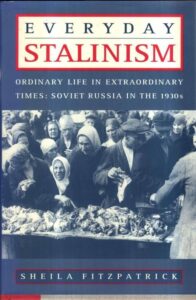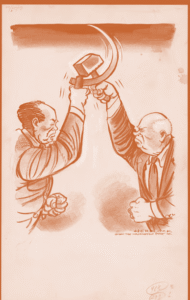Informing an archivist in the post-Soviet space about your plans to work on the international ties of a Soviet republic often elicits a broadly similar response: raised eyebrows, shrugged shoulders, followed by a laconic comment that “it was all done by Moscow anyway.”
Indeed, the classic narrative posits that the Soviet republics were Moscow’s pawns and had little agency of their own. That national identities were systematically repressed until at last, criticism of the Soviet system became possible under glasnost and perestroika. ‘Naturally’ this criticism came to be couched in national terms, and it was national mobilisation that led to, or at least dramatically accelerated, the collapse of the Soviet Union.
While this narrative has some merits, the story is far more complicated. The union republics certainly had agency, even if the centre retained control over most decisions. More importantly even, they acted in highly distinctive ways. Whether it was the foreign ministries they established (in some cases re-established) after the Second World War, the local communist parties, or the cultural and technical elites of different republics – they all acted in ways that could not be scripted (or they routinely deviated from the script). Some honed their national identities with great fervour, others chose not to, or were even denied the possibility. These stories and perspectives need to be explored, for it is all too tempting to reproduce images and narratives of the Soviet Union as one all-powerful, grey steamroller.
In taking up the challenge, however, as others have done before, my article “Across the southern border” in the latest issue of Social History and its exploration of nation-building through international and ‘internationalist’ ties treads on difficult, deeply politicized terrain. In a world in which Moscow is waging war against one of the former union republics, it is all the more important to address questions of national identity and sovereignty in a sober, detached manner. My article offers a ‘bottom-up,’ regional perspective with local voices and local experiences. Sometimes these voices differ significantly from Moscow’s, sometimes they do not, which is an insight in its own right. We need to take all of these voices seriously, if we like them or not, or at least approach them with the same critical distance we apply to other sources.
‘Revisionism’ Revisited
About four months ago, I heard a fascinating talk by a prominent Georgian scholar based in Western Europe, whose discussion of decolonising Soviet and post-Soviet studies included a striking reference to Harvard professor Terry Martin. Martin had famously dubbed the Soviet Union an ‘Affirmative Action Empire’ (2001) – an invasive, centralised and violent state that, at the same time, systematically helped to promote and build nations in its peripheral territories. Almost in passing, the Georgian scholar cautioned against Martin’s ‘revisionist narrative,’ as if this label were not only obvious but also useful.[1]
To my mind, it is neither. The term ‘revisionism’ has a long, contested history. Martin was a student of the historian Sheila Fitzpatrick, whose bottom-up analyses of Stalinism ran counter to established approaches and were soon attacked as ‘revisionist’ for failing to highlight totalitarian rule. While the term was nearly always meant in a derogatory manner, Fitzpatrick, Ronald Suny, Moshe Lewin and others to whom the label was attached also learnt to ‘own’ the abuse.[2] Some even wore it as a badge of honour. Martin, in turn, would describe Fitzpatrick as a ‘revisionist’ but does not include himself in this category.
Should we use and thus perpetuate this term, regardless of whether we are talking about Stalinism or, more specifically, Soviet nationality policy? I have serious doubts about that. A term that is first and foremost a political statement seems of dubious analytical value for distinguishing between different approaches to Soviet politics and society. Historically, ‘revisionism’ has mostly been an accusation, no matter whether it was used by politicians, activists, or scholars.
The Limits of ‘Revisionism’
The German socialist theorist and politician Eduard Bernstein (1850-1932) insisted that socialist theory be subject to ‘revision,’ using this term in a positive sense, while his critics would fiercely reject his ‘revisionism.’ Mao’s criticism of destalinisation in the Soviet Union from 1956 led to endless accusations of purported Soviet ‘revisionism’ under Khrushchev and his successors. Thus the term was used in internal Marxist/socialist battles concerning both basic theory and interpretations of the past.
In the United States, the term acquired perhaps a more balanced reputation. The historian and Pulitzer Prize winner Arthur Schlesinger, for one, spoke of ‘revisionism’ as “a readiness to challenge official explanations” and hailed it as a necessary and recurring part of history and historical reinterpretation.[3] Similarly, some have couched calls for the integration of women’s, black, gay, and other perspectives into mainstream history as much-needed revisionism. While sympathetic observers have thus given the term a more positive twist, critics continue to use it in a disparaging manner. The use of the term is rarely ever neutral.
The challenges to established paradigms in studies of the Soviet Union, mounted by Fitzpatrick, Suny, and other social and cultural historians, along with numerous social scientists, advanced our understanding of Soviet politics, society, and history, in immeasurable ways. The fact that some scholars are now lobbying with great passion for a posthumous resurrection of ‘totalitarianism’ as an analytical category, from Stanford University in the United States to Western and East-Central Europe, only highlights the degree to which the paradigm shift of the long 1970s proved successful and sustainable. Most works published over the last 30 years reflect the research perspective, questions, and methodology of this shift, at least in part. And yet, framing those who initiated and implemented this necessary revision as ‘revisionists’ is a decidedly normative and deeply problematic act. It serves little analytical value. If a historian or social scientist chooses to adopt this term for themselves, fair enough. Owning the abuse has a long history, and as we’ve seen, some have tried to give the term ‘revisionism’ a more positive meaning. Still, it is a battle cry, sometimes for good, but mostly for ill, an artificial construct that has developed a life of its own.
The current political climate is not conducive to dispassionate debate over Soviet history, or history in general. We must choose our vocabulary carefully. Terms that immediately ring alarm bells may not be our first choice. Revisions of established paradigms have been immensely helpful, in Soviet history and beyond. However, it is time to acknowledge and discuss these achievements, along with their blind spots, without adopting the language and terminology of those who belittle them.
Stefan B. Kirmse is a Senior Research Fellow and Research Coordinator at Leibniz-Zentrum Moderner Orient (ZMO), Berlin. His research focuses on Russian and Soviet History. He is principal researcher on the project ‘In Pursuit of ‘Legality’ and ‘Justice’ – Minority Struggles in the Russian Empire and the Soviet Union’.
References
[1] Terry Martin, The Affirmative Action Empire: Nations and Nationalism in the Soviet Union, 1923-1939 (Ithaca, NY, Cornell University Press, 2001).
[2] On these historians and the historiography of the Soviet Union, see Ronald G. Suny, Red Flag Wounded. Stalinism and the Fate of the Soviet Experiment (London, Verso, 2020), esp. part I.
[3] Arthur M. Schlesinger, The Cycles of American History (Boston, Houghton Mifflin Co., 1986), p. 165.


